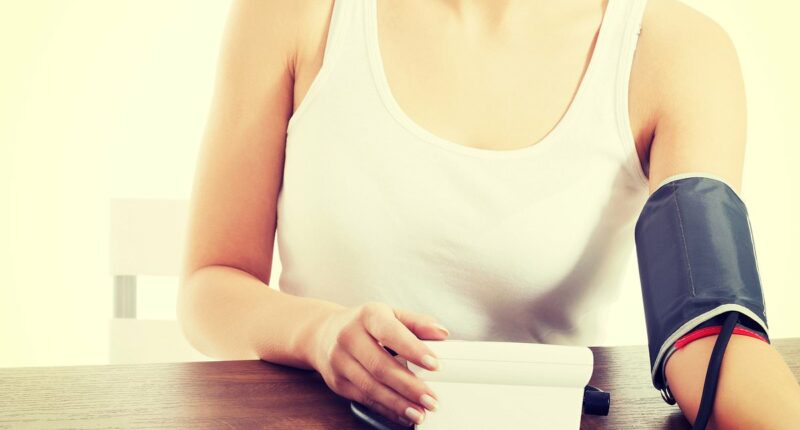Share this @internewscast.com
During a routine check-up with her GP, Pauline Richardson was informed that she had high blood pressure. However, in the wake of her husband’s passing, this news was far from her primary concern.
At just 46, Pauline, a nurse from Hampshire, was navigating the challenges of single-handedly raising two young children while also caring for her terminally ill mother.
“I had gained some weight during that time,” Pauline recalls. “While the stress eventually subsided, the extra weight did not.”
Pauline was aware that her elevated blood pressure increased her chances of experiencing a stroke, heart attack, or dementia. Yet, it wasn’t until years later, after watching a healthy-eating program hosted by the late Dr. Michael Mosley, a former columnist for The Mail on Sunday, that she discovered a solution for shedding the pounds.
“When I saw him discuss his high-protein, low-carb diet, I thought it was something I could try,” Pauline explains. “Combined with more consistent exercise, the weight just started coming off.”
Now 72, and three years into her lifestyle change, Pauline has shed over 30 kilograms (4 stone 8 pounds), performs 140 squats daily, and has successfully maintained her blood pressure at healthy levels—all without the aid of medication.
It seems miraculous, but experts speaking to The Mail on Sunday say that anyone can – and should – fix their high blood pressure through simple lifestyle changes like Pauline’s.
High blood pressure is the leading cause of heart attack and stroke in the UK – impacting nearly 14 million adults.

High blood pressure is the leading cause of heart attack and stroke in the UK – impacting nearly 14 million adults.

Professor David Webb, a clinical pharmacologist at the University of Edinburgh, says losing some weight is an effective way to lower your blood pressure
The condition is rising among young people as well – with nearly 170,000 16-24-year-olds estimated to be living undiagnosed. Also known as hypertension, the condition occurs when the pressure of blood pushing against the heart walls is consistently too high, damaging the arteries and restricting blood flow.
People of African and Caribbean descent, as well as those with a family history of the condition, are more likely to develop hypertension. But being overweight, smoking, not doing enough exercise and eating a diet high in salt can all also contribute.
If left untreated, high blood pressure can be fatal.
But surprisingly, experts say the best way to tackle high blood pressure is not medical treatment but lifestyle changes.
Last week, The Mail on Sunday’s GP columnist Dr Ellie Cannon wrote that high blood pressure is the long-term health condition where she feels patients can make the most difference themselves.
And she asked readers to write in about their own attempts to lower their blood pressure at home – and was flooded with messages.
One 63-year-old man said that eating a daily dose of 85 per cent dark chocolate, as well as more fruit, reduced his blood pressure without him needing to take any medication.
Another 56-year-old woman wrote that swapping to decaffeinated coffee brought her blood pressure down to normal levels.
And a 72-year-old woman said that buying a mini trampoline was her key to reducing her blood pressure.
‘All I need to do is five minutes of exercise in the morning and five in the evening,’ she explained. ‘This can be either bouncing or jogging on the spot, but it has to be fairly energetic. I make sure I’m slightly out of breath before I finish. I was previously prescribed medication, but now I no longer need to take it.’
So here are the eight simple steps that experts say are scientifically proven to reverse your high blood pressure without drugs.
One teaspoon of salt a day… and no more
Cutting out salt from your diet is the single most important thing you can do to lower your blood pressure, says Professor Francesco Cappuccio, a cardiology expert at the University of Warwick.
‘Salt is made up of chloride and sodium – the latter of which we know impacts blood pressure,’ he says. ‘If you reduce your sodium intake, you reduce your blood pressure significantly.’
Too much sodium raises blood pressure by causing the body to retain excess water, which increases the blood’s volume and puts pressure on artery walls.
Most adults in the UK eat about 8g to 9g of salt a day – but the recommended limit is no more than 6g, or about one teaspoon in total.

Too much sodium raises blood pressure by causing the body to retain excess water, which increases the blood’s volume and puts pressure on artery walls
Reducing this amount can lower your blood pressure within just a few weeks, studies have shown.
Experts say the best way to lower intake is to stick to home-cooked food. This is because processed, ready-made foods, such as bread, sauces, soups and ready meals are the main source of added salt in our diets.
But while it’s good to limit your intake of processed foods, you don’t have to go cold turkey, says Professor David Webb, a clinical pharmacologist at the University of Edinburgh.
‘You can retrain yourself by reducing the amount you add when cooking – though food might taste a little bland at first,’ he adds.
‘And don’t add salt at the table, if you can avoid it.’
Shedding a few pounds makes a huge difference
As was the case for Pauline, losing weight can be another key way to bring down blood pressure.
Being overweight or obese causes hypertension due to excess fat, forcing the heart to pump harder in order to supply blood to the body. That strains the heart and increases resistance in the blood vessels.
Likewise, says Prof Webb, sleep apnoea – a disorder often triggered by obesity in which breathing stops and starts repeatedly while in bed – can raise blood pressure significantly at night.
Research shows that losing even 5 to 10 per cent of body weight can lower blood pressure.
But waist size is key: for men, their waist circumference should measure less than 37in (94cm), while for women, waist size should not exceed 31.5in (80cm).
Prof Webb said: ‘If you can lose even a little weight, this can help lower blood pressure.’
Skip the lift and take the stairs
As well as helping you lose weight, research suggests that regular aerobic exercise – physical activity that increases your heart and breathing rates – can have a direct effect on blood pressure. NHS guidelines advise patients with high blood pressure to aim for at least 150 minutes of moderate exercise a week – which includes anything from brisk walking to trampolining.
But one of the most effective ways to get some cardio into your day could just be taking the stairs.

NHS guidelines advise patients with high blood pressure to aim for at least 150 minutes of moderate exercise a week – and taking the stairs can help achieve that
A 2023 study from researchers in China found that climbing five flights of stairs a day reduced the risk of heart attack, stroke and blood clots by 20 per cent.
‘Climbing up stairs is brilliant for blood pressure,’ says Prof Webb. ‘The more breathless and sweaty you get, the better.’
While aerobic exercise raises your blood pressure in the short term, it has long-term benefits for your heart. ‘It controls the heart rate, keeps muscles healthy and is generally a very good thing to do for your health,’ says Professor Cappuccio. ‘And it’s a good preventative strategy to delay the rise in blood pressure that happens naturally with age, even if you don’t yet have hypertension.’
Daily squats could be the answer
Strength training is just as crucial as aerobic exercise in lowering hypertension.
This could involve lifting weights or using resistance bands, or doing bodyweight exercises such as push-ups or wall-sits.
And while Pauline likes squats, others may prefer to plank – an abdominal exercise that involves holding a position similar to a push-up without bending the arms.

As well as helping to tone your glutes, regular squats can lower hypertension and thus lower blood pressure
For 80-something Tony Gregory, it was a 30-second plank every morning that brought down his blood pressure. ‘I had read about over 100 clinical trials that involved about 100,000 participants that showed doing the plank was especially effective in helping to control blood pressure – and this certainly appears to be working for me!’ he wrote.
Prof Webb adds: ‘It’s not exactly clear why any of these exercises are so good for blood pressure, but we think it’s likely because they improve cardiac efficiency and reduce resistance in blood vessels.
‘They can change the way the heart and blood vessels work.’
For those looking to lower their blood pressure, Prof Webb advises weight training three times a week (even if only for 10-15 minutes) alongside aerobic exercise.
Eat more bananas and lentils
Eating more bananas may also help lower blood pressure. The fruit is packed with potassium, a mineral which helps the body balance sodium.
Other great sources of potassium include kiwi fruit, potatoes, beans, lentils, leafy greens, yogurt, avocado and salmon.
‘We don’t eat enough potassium in our diets – particularly as there’s hardly any of the nutrient in processed foods,’ says Prof Cappuccio.
However, experts warn patients to be wary of over-supplementing the nutrient.
Adults aged 19 to 64 only need about 3,500mg of potassium a day – though the American Heart Foundation recommends up to 5,000mg a day for managing high blood pressure. Regularly exceeding this amount can damage the kidneys.
Swap a glass of orange for… beet juice
A glass of bright red beet juice may seem an odd cure for hypertension. But recent studies show beets – or their juice – can help lower blood pressure due to their high content of inorganic nitrate.
When consumed, whether eating or drinking it, this nitrate is converted into nitric oxide, a compound shown to relax blood vessels and improve blood flow.
Research from scientists at the University of Exeter found that a glass of beetroot juice twice a day significantly lowered blood pressure in adults aged 67 to 79.

Beet juice contains nitrates and antioxidants that can lower blood pressure
Derek Peel, 75, told us: ‘I suffered on and off with high blood pressure until I discovered beetroot.
‘I take a large glass of warm water with a squeeze of lemon juice and a teaspoon of beetroot powder mixed in every morning. Some days I might take a beetroot tablet as well – it really does work and I don’t take any medication.’
Prof Webb says: ‘There’s definitely evidence that beetroot does lower blood pressure, but we need more research into it. It’s certainly not an alternative to exercise or cutting down on salt, but might be something to take alongside.’
Ditch booze – one pint could put you at risk
Alcohol has been proven to raise blood pressure – even in moderate amounts, says Prof Cappuccio.
‘Studies have shown that the morning after binge drinking, there’s an increase in stroke rates as the body’s blood pressure is surging,’ he explains.
‘But even regular light to moderate drinking will have a sustained effect in terms of lifetime risk.’
Alcohol raises blood pressure, in the short and long-term, by stimulating the nervous system, which raises heart rate and narrows blood vessels. Regularly drinking more than the recommended limits can also cause lasting high blood pressure by limiting the brain’s ability to regulate blood pressure.
This sustained high pressure can strain the heart muscle and damage blood vessel walls, increasing the risk of heart attack and stroke.
One 2023 study, spanning several decades and including 20,000 people, suggests that blood pressure increases in line with alcohol consumption, starting from as little as one glass of wine per day.
To limit damage, don’t drink more than 14 units – not drinks – of alcohol a week, and spread this over several days, to give the body a chance to recover, NHS guidelines say.
Try to get six to eight hours’ sleep each night
Sleep is crucial to health – and blood pressure is no exception.
‘It’s an environmental factor that has been neglected for many years, but lots of studies in recent years have shown the importance of good sleep for blood pressure,’ says Prof Cappuccio.
‘The chance of developing high blood pressure is two to three times higher for sleep-deprived people. Whereas if you sleep for longer, research shows that your blood pressure will go down.
‘Sleep also has a massive effect on weight gain, which in turn affects blood pressure. We should really all be making an effort to sleep for at least six to eight hours a night.’
To do this, he says: ‘Make sure your bedroom is a place to sleep – not live. Dim the lights, get rid of any screens, keep it at a cosy temperature and read a nice book.’
I ran back to health in memory of my mum
Bradley Pike had never been particularly healthy. But after his mum died from a heart condition in 2023, the dad-of-three began to slip into even worse habits than before.
‘I started drinking and smoking loads, as a way to deal with the grief,’ the 31-year-old, pictured left, says. ‘I felt ill all the time and was having dizzy spells a lot.’
Bradley went to his GP, who ran tests that revealed he was prediabetic and had worryingly high blood pressure.

Bradley Pike lowered his blood pressure through running and lost 2.5st in the process
‘They were reluctant to put me on drugs, because I’d need to be on them for life and I was so young,’ he explains. ‘But they told me I needed to change my lifestyle.’ Luckily for Bradley, the route back to health dropped into his lap a few weeks later. He was offered a place in the London Marathon by the British Heart Foundation in memory of his mother.
At first, training was incredibly difficult, due to his weight and blood pressure. But he stuck with it.
In three months, he lost 2.5st (15kg) and brought his blood pressure down to normal levels. He has since run two more marathons and completed a 62-mile (100km) ultramarathon across the Gower Peninsula. ‘I look back at my life before and barely recognise myself,’ he says. ‘There’s so much you can do to turn your health around. All you have to do is start.’











